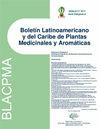肉桂油及其主要成分肉桂酸和肉桂醛对1-甲基-4-苯基-1,2,3,6-四氢吡啶诱导的PC-12细胞神经变性的影响
IF 0.7
4区 医学
Q4 INTEGRATIVE & COMPLEMENTARY MEDICINE
Boletin Latinoamericano y del Caribe de Plantas Medicinales y Aromaticas
Pub Date : 2023-11-30
DOI:10.37360/blacpma.23.22.6.56
引用次数: 0
摘要
肉桂(Cinnamomum verumJ.Presl)是一种著名的药用植物,被认为是基于波斯医学的神经系统疾病的有效治疗。本研究的目的是评估肉桂油、肉桂酸和肉桂醛对帕金森病(PD)体外模型的影响。采用高效液相色谱法对芝麻油中肉桂油进行了植物化学分析。嗜铬细胞-12 (PC-12)细胞用1-甲基-4-苯基-1,2,3,6-四氢吡啶(MPTP)处理作为PD神经退行性变的体外模型。评估细胞活力、半胱天冬酶活性和活性氧(ROS)的形成。MPTP显著降低细胞活力,增加Casp活性,以及ros的形成。200 μg/ ml肉桂油和肉桂酸可显著逆转mptp诱导的PC-12细胞异常,包括Casp活性和ROS形成。我们的研究支持肉桂油对神经变性的有益作用。需要进一步的研究来阐明其作用机制和主要活性成分。本文章由计算机程序翻译,如有差异,请以英文原文为准。
Effects of cinnamon oil and its main constituents, cinnamic acid and cinnamaldehyde, on 1-methyl-4-phenyl-1,2,3,6-tetrahydropyridine-induced neurodegeneration in PC-12 cells
Cinnamon (Cinnamomum verumJ.Presl) is a well-known medicinal plant considered as an effective treatment for neurological disorders based on Persian medicine. The aim of the present study was assessing the effect of cinnamon oil, cinnamic acid, and cinnamaldehyde, on the in vitromodel of Parkinson's disease (PD). Cinnamon oil, prepared in sesame oil, was phytochemically analyzed using high performance liquid chromatography (HPLC). Pheochromocytoma-12 (PC-12) cells were treated with 1-methyl-4-phenyl-1,2,3,6-tetrahydropyridine (MPTP) as an in vitromodel of neurodegeneration in PD. Cell viability, activity of caspase enzymes, and formation of reactive oxygen species (ROS) were evaluated. MPTP significantly decreased cell viability and increased Casp activity, as well asROS formation. Cinnamon oil and cinnamic acid at 200 μg/mLcould significantly reverse MPTP-induced abnormalities in PC-12 cells including Casp activity and ROS formation. Our study supports the beneficial effect of cinnamon oil in neurodegeneration. Further investigations are needed to clarify the mechanisms and main active components.
求助全文
通过发布文献求助,成功后即可免费获取论文全文。
去求助
来源期刊

Boletin Latinoamericano y del Caribe de Plantas Medicinales y Aromaticas
PHARMACOLOGY & PHARMACY-
CiteScore
1.30
自引率
14.30%
发文量
49
审稿时长
6-12 weeks
期刊介绍:
The Boletín Latinoamericano y del Caribe de Plantas Medicinales y Aromáticas (BLACPMA), [Latin American and Caribbean Bulletin of Medicinal and Aromatic Plants]; currently edited by the publishing house MS-Editions, is a bi-monthly international publication that publishes original peerreviewed research in the field of medicinal and aromatic plants, with nearly 20 years of experience. BLACPMA is a scientific journal that publishes two types of articles: Reviews (only in English) and Original Articles (Spanish or English), its main lines of action being agronomy, anthropology and ethnobotany, industrial applications, botany, quality and standardization, ecology and biodiversity, pharmacology, phytochemistry, pharmacognosy, regulatory and legislative aspects. While all areas of medicinal plants are welcome and the experimental approaches used can be broad and interdisciplinary; other areas of research that are not mentioned depend on the Editorial Committee for their acceptance.
 求助内容:
求助内容: 应助结果提醒方式:
应助结果提醒方式:


